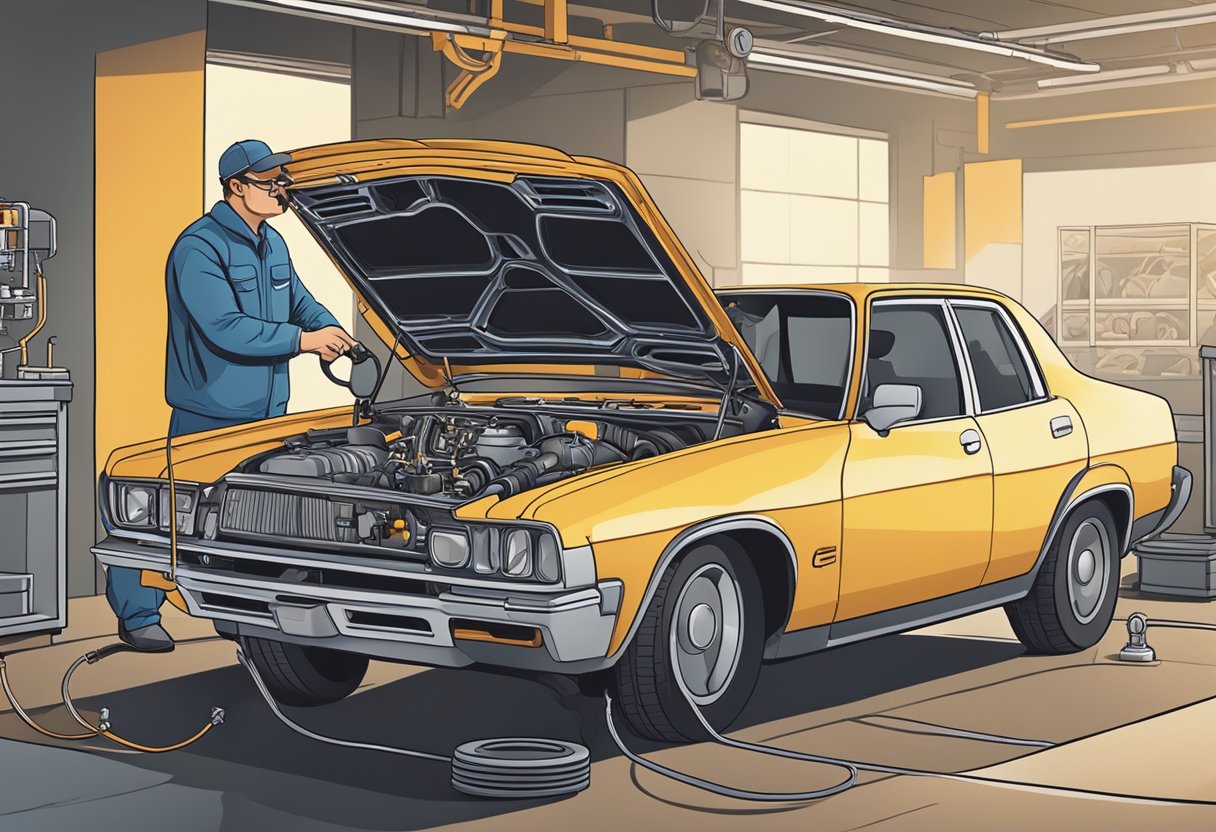When you press down on the accelerator pedal, you expect your car to respond immediately. However, sometimes you may notice that your car hesitates before accelerating. This can be frustrating and even dangerous in certain situations, such as when merging onto a highway or passing another vehicle. In this article, we’ll explore some of the common reasons why your car hesitates when accelerating.
One possible cause of a car hesitating when accelerating is a problem with the fuel system. This could be due to a clogged fuel filter, a malfunctioning fuel pump, or a dirty fuel injector. Another possible culprit is a problem with the ignition system, such as a faulty spark plug or ignition coil. In some cases, a car may hesitate when accelerating due to a problem with the transmission, such as low transmission fluid or a worn-out clutch.
If you’re experiencing a hesitation when accelerating, it’s important to get it checked out by a mechanic. Ignoring the problem could lead to more serious issues down the road. By identifying the root cause of the problem, you can address it promptly and ensure that your car is running smoothly and safely.
Understanding Engine Hesitation
If your car hesitates when accelerating, it can be frustrating and potentially dangerous. Engine hesitation is a common problem that can have many causes, but it is usually a symptom of an underlying issue with your vehicle. In this section, we will discuss the symptoms of engine hesitation and the common causes of acceleration delay.
Symptoms of Engine Hesitation
Engine hesitation can manifest in several ways, including jerking, misfiring, shaking, stalling, and delay. When you try to accelerate, you may feel a delay in power or a loss of power altogether. Your car may also shake or jerk when you try to accelerate, or it may stall completely. These symptoms can be intermittent or consistent, and they can occur at any speed.
Common Causes of Acceleration Delay
There are several common causes of engine hesitation when accelerating. Some of the most common causes include issues with the ignition system, fuel delivery, sensors, control modules, circuits, and vacuums. Problems with any of these components can cause your vehicle to hesitate when you try to accelerate.
Another common cause of engine hesitation is a clogged fuel filter. If your fuel filter is dirty or clogged, it can restrict the flow of fuel to your engine, causing it to hesitate or stall. Similarly, a faulty fuel pump can also cause engine hesitation, as it may not be delivering enough fuel to the engine.
In some cases, engine hesitation can be caused by a problem with the air intake system. If there is a vacuum leak or a problem with the mass airflow sensor, your engine may not be getting the air it needs to function properly. This can cause hesitation, as well as other issues like rough idle and poor fuel economy.
Overall, engine hesitation is a common problem that can have many causes. If you are experiencing acceleration delay, it is important to have your vehicle diagnosed by a qualified mechanic to determine the underlying cause of the issue. By addressing the root cause of the problem, you can ensure that your vehicle is running smoothly and safely.
Fuel System Issues
If your car hesitates when accelerating, there’s a good chance that the fuel system is to blame. The fuel system is responsible for delivering fuel to the engine, and if there’s an issue with any of its components, your car may hesitate or stall during acceleration.
Fuel Filter and Pump Problems
One of the most common fuel system issues is a clogged fuel filter or a faulty fuel pump. A clogged fuel filter can restrict fuel flow to the engine, causing it to hesitate or stall during acceleration. On the other hand, a faulty fuel pump may not be able to deliver enough fuel to the engine, which can also cause hesitation or stalling.
To diagnose a fuel filter or pump problem, you can check the fuel pressure using a fuel pressure gauge. If the pressure is below the manufacturer’s specifications, it’s a sign that there’s an issue with the fuel filter or pump. In this case, you may need to replace the fuel filter or pump to restore proper fuel flow to the engine.
Fuel Injectors and Pressure Concerns
Another potential issue with the fuel system is a problem with the fuel injectors or fuel pressure. Fuel injectors are responsible for spraying fuel into the engine, and if they’re clogged or not functioning properly, your car may hesitate or stall during acceleration. Similarly, if the fuel pressure is too low, the engine may not be getting enough fuel to accelerate properly.
To diagnose a fuel injector or pressure problem, you can use a fuel pressure gauge or a scan tool to check for error codes related to the fuel system. If the fuel pressure is low or there are error codes related to the fuel injectors, you may need to replace the injectors or address the pressure issue to restore proper fuel flow to the engine.
In summary, fuel system issues are a common cause of hesitation when accelerating. If you suspect that your car is experiencing fuel system problems, it’s important to diagnose and address the issue as soon as possible to avoid further damage to your engine.
Air Intake and Exhaust Complications
If your car is hesitating when accelerating, one of the possible causes could be air intake and exhaust complications. These complications can affect the amount of air and fuel mixture that enters the engine, which can lead to hesitation and other performance issues.
Air Filter and MAF Sensor
The air filter and mass air flow (MAF) sensor are two components that play a crucial role in the air intake system. The air filter prevents dirt, debris, and other contaminants from entering the engine, while the MAF sensor measures the amount of air entering the engine.
A clogged air filter can restrict airflow, which can cause your car to hesitate when accelerating. In addition, a faulty MAF sensor can also cause hesitation, as it may not be accurately measuring the amount of air entering the engine. If you suspect that either of these components is causing your car to hesitate, it’s important to have them checked and replaced if necessary.
EGR Valve and Oxygen Sensors
The exhaust gas recirculation (EGR) valve and oxygen sensors are two components that play a crucial role in the exhaust system. The EGR valve recirculates exhaust gas back into the engine, which can reduce emissions and improve fuel efficiency. The oxygen sensors measure the amount of oxygen in the exhaust, which can help your car’s computer adjust the air/fuel mixture.
A faulty EGR valve or oxygen sensor can cause your car to hesitate when accelerating. For example, a clogged EGR valve can cause a lack of airflow, which can lead to hesitation. Similarly, a faulty oxygen sensor can cause your car’s computer to incorrectly adjust the air/fuel mixture, which can also lead to hesitation.
In conclusion, air intake and exhaust complications can be a possible cause of hesitation when accelerating. If you suspect that any of the components mentioned above are causing your car to hesitate, it’s important to have them checked and replaced if necessary.
Ignition System Malfunctions
When your car hesitates during acceleration, the ignition system is one of the first places to look. The ignition system is responsible for igniting the air-fuel mixture inside the engine to create the energy needed to propel your car down the road. Any malfunction in this system can cause hesitation, misfires, and even stalling. In this section, we will discuss some of the common ignition system malfunctions that can cause your car to hesitate during acceleration.
Spark Plugs and Ignition Coil Issues
Worn-out or bad spark plugs can cause your car to hesitate during acceleration. Over time, spark plugs can become fouled, corroded, or worn out, which can cause misfires and hesitation. Similarly, a faulty ignition coil can cause the engine to misfire and hesitate under load. If you suspect that your spark plugs or ignition coil are causing the problem, it’s best to have them checked by a professional mechanic.
Ignition Timing and System Checks
The ignition timing is critical to the proper functioning of the engine. If the timing is off, it can cause hesitation, misfires, and even damage to the engine. A professional mechanic can check the ignition timing and make any necessary adjustments. On top of that, a diagnostic scan tool can be used to check the ignition system for any fault codes or issues.
To summarize, the ignition system is a critical component of your car’s engine. Any malfunction in this system can cause hesitation, misfires, and even stalling. If you suspect that your ignition system is causing the problem, it’s best to have it checked by a professional mechanic.
Is a Leaking Shock Absorber a Possible Cause of Hesitation When Accelerating?
Sensor and Electronic Control
If your car hesitates when accelerating, it could be due to an issue with the sensors and electronic control system. Here are two areas to check:
Throttle Position and Oxygen Sensors
The throttle position sensor (TPS) and oxygen sensors (O2 sensors) are crucial components in the electronic control system of your car. The TPS measures the position of the throttle plate and sends this information to the engine control unit (ECU). The ECU then adjusts the air-fuel mixture to maintain optimal performance. The O2 sensors measure the amount of oxygen in the exhaust gases and send this information to the ECU. The ECU then adjusts the air-fuel mixture to maintain optimal fuel efficiency.
If the TPS or O2 sensors are faulty, they can cause your car to hesitate when accelerating. The check engine light may also come on, and the ECU may store a fault code related to the sensor. If you suspect an issue with these sensors, it’s best to have a professional mechanic diagnose and fix the problem.
Engine Control Unit Diagnostics
The engine control unit (ECU) is the brain of your car’s electronic control system. It receives information from various sensors and makes adjustments to ensure optimal performance and fuel efficiency. If the ECU is faulty, it can cause your car to hesitate when accelerating.
To diagnose an ECU issue, you can use an OBD-II scanner to read the fault codes stored in the ECU. These codes can give you an idea of the problem, but they don’t always provide a definitive diagnosis. A professional mechanic can use specialized diagnostic tools to pinpoint the issue and make the necessary repairs.
In conclusion, the TPS, O2 sensors, and ECU are critical components in your car’s electronic control system. If you suspect an issue with these components, it’s best to have a professional mechanic diagnose and fix the problem.
Maintenance and Professional Assistance
Routine Tune-Up and Cleaning
Regular maintenance is essential to keep your car running smoothly and safely. A routine tune-up and cleaning can help prevent hesitation and other performance issues. A tune-up typically involves replacing spark plugs, ignition wires, air filters, and fuel filters. These components wear out over time and can cause your engine to hesitate or misfire. Regular cleaning of the throttle body and fuel injectors can also help improve engine performance.
To keep your car running smoothly, it’s important to follow the manufacturer’s recommended maintenance schedule. This will vary depending on your car’s make, model, and year. Be sure to consult your owner’s manual or speak with a professional mechanic to determine the appropriate maintenance schedule for your vehicle.
When to Visit a Mechanic
If your car continues to hesitate after a routine tune-up and cleaning, it may be time to visit a mechanic. A professional mechanic can diagnose and repair any underlying issues that may be causing your car to hesitate. Some common issues that can cause hesitation include a faulty mass airflow sensor, a clogged fuel injector, or a malfunctioning oxygen sensor.
Don’t ignore hesitation or other performance issues. These issues can cause your car to be unsafe to drive and can lead to more serious problems down the road. If you notice any issues with your car’s performance, it’s best to have it inspected by a professional mechanic as soon as possible.
Remember, regular maintenance and professional assistance are key to keeping your car running smoothly and safely.
As an Amazon Associate we earn from qualifying purchases.














